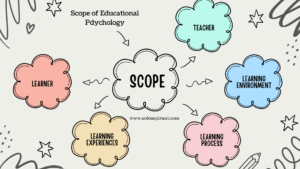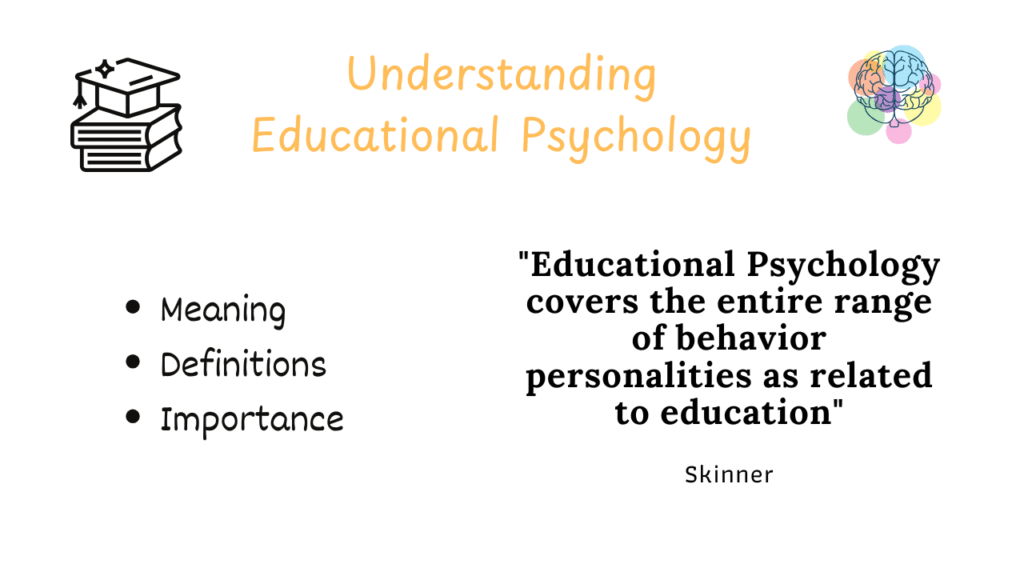Educational Psychology
The term “Educational Psychology” is made up of two core words: “Education” and “Psychology“.
- Education modifies human behavior, while
- Psychology studies human behavior.
Scope of Educational Psychology
The subject matter of educational psychology comprises the following key components:

1. Learner
2. Learning Experiences
3. Learning Process
4. Learning Environment
5. Teacher
1. Learner
- The entire subject matter of educational psychology revolves around the learner.
- Educational psychology helps in understanding learners’ development, stages of growth, individual differences, intelligence, adjustment abilities, personality, interests, and aptitudes.
2. Learning Experiences
- The teacher plans various learning experiences to facilitate the learner’s development.
- Educational psychology helps in selecting appropriate teaching methods, strategies, and developmental stages to enhance learning.
3. Learning Process
- Educational psychology examines the principles and theories of learning, taking into account the learner and the necessary learning experiences.
- It explores how learning occurs and the factors that influence effective learning.
4. Learning Environment
- Learning environment is an important factor for effective teaching and learning experiences.
- The Environment should be positive, peaceful, democratic, inclusive, and flexible.
- Two-way interaction should be there between the teacher and students.
5. Teacher
- When we say a teacher wears multiple hats, a teacher is a facilitator, motivator, coach, guide, or counselor.
- Educational psychology discusses the role of teachers in facilitating learning, considering their motivation, mental health, interests, adjustment levels, and aspirations.
- It emphasizes the importance of teachers’ self-awareness and preparedness to fulfill their role in education effectively.
Contributions of Educational Psychology
- Stages of Growth and Development: A human passes through different stages of development in life. These stages are Prenatal, Infancy, Early Childhood, Later Childhood, Adolescence, and Adulthood. Each developmental stages have its own characteristics, and educational psychology helps to understand these stages.
- To understand Individual Differences: Each students have different abilities, intelligence, needs, interests, and mental level in a classroom. Educational Psychology helps the teacher to understand individual differences. The knowledge of individual differences of the learner helps the teacher to equip better teaching methods, strategies, and aids to meet the needs and requirements of the classroom.
- Knowledge of Mental Health: Mental health of the teacher and students is essential for the effective teaching and learning process.
Educational psychology helps the teacher to understand various factors that are responsible for mental health and maladjustment of a learner. - Curriculum Design and Construction: Educational Psychology principles contribute to the construction of a Curriculum. Such as Child-Centered education, flexible curriculum, learning by doing, etc.
- Selection of effective teaching methods: Educational Psychology gives us the knowledge of appropriate methods of teaching. It helps in developing new strategies for teaching.
- Measurement of Learning Outcomes: Psychological Tools helps the teacher evaluate the effectiveness of teaching and learning outcomes of the students. Also, it helps the teacher to evaluate their own performance.
Educational Psychology has major contributions in the field of education. It helps the teacher to understand or identify the needs, interests, individual differences, intelligence, cognitive ability, and problems of a child. This helps the teacher to adopt better teaching methods, strategies, and teaching aids to facilitate efficient teaching and learning.
Hi, I’m Amit Kumar — the author of SoloAspirant.
I am a part-time blogger and tutor with a background in Physics and a B.Ed. Through this platform, I share study materials, notes, and PYQ PDFs curated to help aspirants prepare effectively for teaching and competitive exams.


